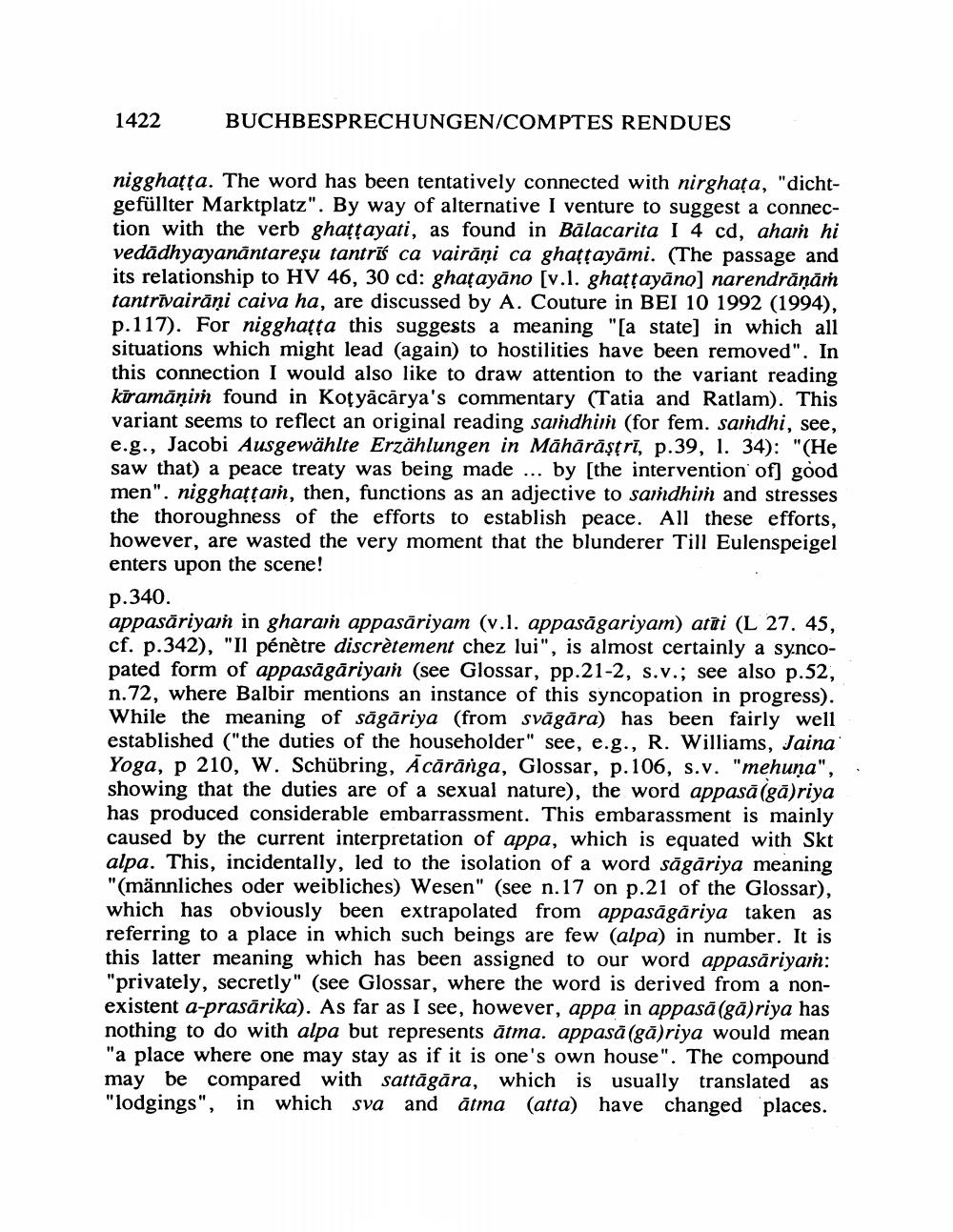Book Title: Buchbesprechungen Comptes Rendues Author(s): Nalini Balbir Publisher: Nalini Balbir View full book textPage 8
________________ 1422 BUCHBESPRECHUNGEN/COMPTES RENDUES nigghatta. The word has been tentatively connected with nirghata, "dichtgefüllter Marktplatz". By way of alternative I venture to suggest a connection with the verb ghattayati, as found in Balacarita I 4 cd, ahaṁ hi vedādhyayanántareşu tantris ca vairāņi ca ghattayāmi. (The passage and its relationship to HV 46, 30 cd: ghatayāno [v.1. ghattayāno] narendrānāṁ tantrivairāņi caiva ha, are discussed by A. Couture in BEI 10 1992 (1994), p. 117). For nigghasța this suggests a meaning "[a state) in which all situations which might lead (again) to hostilities have been removed". In this connection I would also like to draw attention to the variant reading kīramāṇin found in Kotyācārya's commentary (Tatia and Ratlam). This variant seems to reflect an original reading samdhim (for fem. saindhi, see, e.g., Jacobi Ausgewählte Erzählungen in Māhārāștri, p.39, 1. 34): "(He saw that) a peace treaty was being made ... by [the intervention of] good men". nigghattam, then, functions as an adjective to samdhim and stresses the thoroughness of the efforts to establish peace. All these efforts, however, are wasted the very moment that the blunderer Till Eulenspeigel enters upon the scene! p.340. appasāriyain in gharain appasăriyam (v.1. appasāgariyam) atãi (L 27. 45, cf. p.342), "Il pénètre discrètement chez lui", is almost certainly a syncopated form of appasāgāriyain (see Glossar, pp.21-2, s.v.; see also p.52, n.72, where Balbir mentions an instance of this syncopation in progress). While the meaning of sāgāriya (from svāgāra) has been fairly well established ("the duties of the householder" see, e.g., R. Williams, Jaina Yoga, p 210, W. Schübring, Acāranga, Glossar, p. 106, s.v. "mehuņa", . showing that the duties are of a sexual nature), the word appasā (gā)riya has produced considerable embarrassment. This embarassment is mainly caused by the current interpretation of appa, which is equated with Skt alpa. This, incidentally, led to the isolation of a word sāgāriya meaning "(männliches oder weibliches) Wesen" (see n. 17 on p.21 of the Glossar), which has obviously been extrapolated from appasāgāriya taken as referring to a place in which such beings are few (alpa) in number. It is this latter meaning which has been assigned to our word appasāriyam: "privately, secretly" (see Glossar, where the word is derived from a nonexistent a-prasārika). As far as I see, however, appa in appasā (gā)riya has nothing to do with alpa but represents ātma. appasă (gā)riya would mean "a place where one may stay as if it is one's own house". The compound may be compared with sattāgāra, which is usually translated as "lodgings", in which sva and ātma (atta) have changed places.Page Navigation
1 ... 6 7 8 9 10 11 12 13 14 15
